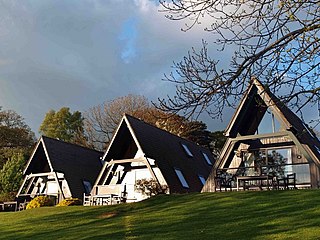
Starwood Hotels and Resorts Worldwide, Inc. was one of the largest companies that owned, operated, franchised and managed hotels, resorts, spas, residences, and vacation ownership properties. It was acquired by Marriott International in 2016. Starwood was founded in 1969 as a real estate investment trust. In 1995, it was acquired and reorganized by Barry Sternlicht, who was its chairman until 2005 and founder of the Starwood Capital Group. Starwood had 11 brands and owned, managed, or franchised 1,297 properties comprising 370,000 hotel rooms in approximately 100 countries.

A timeshare is a property with a divided form of ownership or use rights. These properties are typically resort condominium units, in which multiple parties hold rights to use the property, and each owner of the same accommodation is allotted their period of time. Units may be sold as a partial ownership, lease, or "right to use", in which case the latter holds no claim to ownership of the property. The ownership of timeshare programs is varied, and has been changing over the decades.
The Disney Vacation Club (DVC) is a vacation timeshare program owned and operated by Disney Vacation Development, Inc., a subsidiary of Disney Signature Experiences, a division of Disney Experiences, a segment of The Walt Disney Company. It allows buying a real estate interest in a DVC resort via a flexible points-based membership system. There are an estimated 220,000 club members.
Home exchange, also known as house swapping, is a form of lodging in which two parties agree to offer each other homestays for a set period of time. Since no monetary exchange takes place, it is a form of barter, collaborative consumption, and sharing. Home exchange can cover any type of residence including apartments, houses, holiday cottages, boats, or recreational vehicles. It can include an exchange of the entire home or just a room. The length of the swap can vary from a weekend to over a year. The swap can be simultaneous or non simultaneous. Home exchanges are usually arranged via specific types of social networking services, most of which charge a fee.

A vacation rental is the renting out of a furnished apartment, house, or professionally managed resort-condominium complex on a temporary basis to tourists as an alternative to a hotel. The term vacation rental is mainly used in the US. Other terms used are self-catering rental, holiday home, holiday let, cottage holiday and gite.
Fractional ownership is a method in which several unrelated parties can share in, and mitigate the risk of, ownership of a high-value tangible asset, usually a jet, yacht or piece of resort real estate. It can be done for strictly monetary reasons, but typically there is some amount of personal access involved. One of the main motivators for a fractional purchase is the ability to share the costs of maintaining an asset that will not be used full-time by one owner.

Marriott Vacation Club is the primary timeshare brand of Marriott Vacations Worldwide Corporation. The brand comprises around 70 Marriott Vacation Club properties throughout the United States, Caribbean, Central America, Europe, and Asia. Marriott Vacation Club resorts consist of one, two, and three-bedroom villas, with more than 400,000 owners.
Travel + Leisure Co. is an American timeshare company headquartered in Orlando, Florida. It develops, sells, and manages timeshare properties under several vacation ownership clubs, including Club Wyndham and WorldMark by Wyndham, and provides timeshare exchange services, primarily through RCI.
Trading Places International (TPI) is a corporation located in Lake Forest, California. TPI provides a full spectrum of vacation services to vacation interval owners, resort associations, and resort developers. They rank third worldwide in independent vacation exchanges confirmed annually at hundreds of resorts. The company specializes in association and resort management, vacation exchanges, rentals, owner resales, traditional travel, and developer support offerings.
Hilton Grand Vacations Inc. is a multi-national company that is based in Orlando, Florida, United States. It manages and operates the Hilton Worldwide timeshare and vacation ownership brands under an exclusive licensing agreement with Hilton Worldwide. HGV was formerly a wholly owned subsidiary of Hilton Worldwide until it was spun off into a publicly traded company in 2017. Even though HGV is an independent company post spin-off, Hilton Worldwide still retains full ownership of the Hilton Grand Vacation Club, Hilton Vacation Club, and Hilton Club brands that HGV manages and operates for them. These timeshare brands are all part of Hilton Worldwide's portfolio of 22 hotel and resort brands.

Bluegreen Corporation is an American private vacation ownership brand that is currently a wholly owned subsidiary of Hilton Grand Vacations. The company provides vacations at 50 owned or managed resorts on a time-share basis, with alternative resort and cruise options available through upselling and third-party exchanges. Bluegreen makes its services available to other resort operators on a fee-for-service basis.

Marriott Vacations Worldwide Corporation is a pure-play public timeshare company. Formerly a division of Marriott International, Marriott Vacations Worldwide was established as a separate, publicly traded entity focusing primarily on vacation ownership in November 2011. Marriott Vacations Worldwide runs more than 120 resorts with over 700,000 Owners and Members. Its brands include Marriott Vacation Club, Marriott Vacation Club Pulse, Grand Residences by Marriott, and The Ritz-Carlton Destination Club. The Company also operates Interval International, which offers an exchange network and travel membership programs through a network of more than 3,200 affiliated resorts in over 90 countries and territories.
Diamond Resorts is a wholly owned subsidiary of Hilton Grand Vacations. Diamond Resorts was an independent timeshare and vacation ownership company until it was purchased by HGV in 2021. Following the purchase, Diamond's resorts became part of HGV's resort portfolio, and Diamond itself became a brand and subsidiary of HGV. The majority of Diamond Resorts have been or will be rebranded as Hilton vacation Club properties, however the original brand will continue to exist as some resorts are slated to retain the Diamond Resorts name.
Brent Handler is an American entrepreneur who works in the destination club industry. He is founder and CEO of Inspirato, a private, luxury destination club. In 2002, along with his brother Brad Handler, he founded Exclusive Resorts and served as the company's president from 2002 to 2009. He is based in Denver, Colorado.
Brad Handler is an American entrepreneur and attorney best known for his success in the destination club industry and his role as the first in-house attorney at eBay. He is a founder and chairman of Inspirato, a private, luxury destination club. In 2002, along with his brother Brent Handler, he founded Exclusive Resorts, where he served as chairman, CEO and vice-chairman. He served as eBay's in-house attorney from 1997 to 2001. He is based in Palo Alto, California.
Apple Leisure Group (ALG) is an American travel and hospitality conglomerate focused on packaged travel and resort/brand management in Mexico, the Caribbean, Hispanic America, Europe, and the Middle East. It is the parent corporation of the resort and brand management company AMResorts. ALG also oversees fourteen subsidiaries, including tour operators Apple Vacations and Travel Impressions, online travel agency CheapCaribbean.com, and destination management company AMStar DMC. Its headquarters are in Newtown Square, Pennsylvania. It is a subsidiary of Hyatt Hotels Corporation. As of October 2019, ALG is also the largest seller of charter flights, providing transport to 3.2 million passengers annually from the United States to Mexico, the Dominican Republic, Jamaica, and the Caribbean.

Vida Vacations is a vacation membership company, which allows its customers to purchase a Right to Use and, more recently, a real estate interest in 15 resorts in Mexico. It was founded in 2010 by Grupo Vidanta, and was originally named "Vida Vacation Club". Before that, in the 1990s it was called Vidafel and sold only timeshares. The total number of rooms is approximately 7,000.

Welk Resort Group is a corporation based in San Marcos, California that is a developer and operator of luxury resorts and timeshares in the United States and Mexico. It was founded in 1964 by television bandleader Lawrence Welk. As of 2015, the company has developed five properties in Cabo San Lucas, Lake Tahoe, San Diego, Palm Springs and Branson.
Minor Hotels is an international hotel owner, operator, and investor headquartered in Bangkok, Thailand, with more than 550 hotels in over 55 countries across Asia-Pacific, the Middle East, Africa, the Indian Ocean, Europe, and the Americas. Minor Hotels operates as a subsidiary of Minor International, one of the largest hospitality and leisure companies in the Asia-Pacific region. The group operates hotels under the brands of Anantara Hotels & Resorts, Avani Hotels & Resorts, Elewana Collection, Oaks Hotels, Resorts & Suites, NH Hotels, NH Collection, nhow Hotels, and Tivoli Hotels & Resorts.
ThirdHome is a global home exchange service, specializing in luxury properties, founded by Wade Shealy in 2010. With its headquarters in Brentwood, Tennessee, United States, the company operates internationally, positioning itself uniquely to cater exclusively to owners of second homes.







